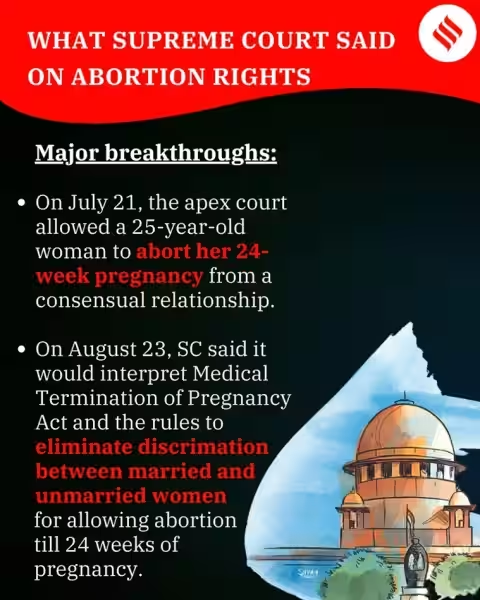Ahmedabad
(Head Office)Address : 506, 3rd EYE THREE (III), Opp. Induben Khakhrawala, Girish Cold Drink Cross Road, CG Road, Navrangpura, Ahmedabad, 380009.
Mobile : 8469231587 / 9586028957
Telephone : 079-40098991
E-mail: dics.upsc@gmail.com

Abortion Laws in India
News: Recently, the Supreme Court declined a married woman’s plea to abort (medically terminate) her 26-week pregnancy.
Background:
• The woman had approached the Supreme Court, seeking abortion, as she was already a mother of two and was suffering from post-partum depression after the birth of her second child.
• The women pleaded the SC that she wasn’t in any condition to raise another child.
What is Abortion and what is the debate around Abortion?
• An abortion is a medical procedure to terminate a pregnancy. It uses medication or a surgical procedure to end the pregnancy. However, this medical procedure has a ‘Pro-Choice’ vs ‘Pro-Life’ surrounding it.
Pro-Life arguments
• Life begins at conception; therefore, abortion is akin to murder as it is the act of taking human life.
• Adoption is a viable alternative to abortion and accomplishes the same result.
• Abortion should not be used as another form of contraception.
Pro-Choice Arguments
• It supports abortion rights of women. Right of women to ‘bodily autonomy’ is paramount.
• Abortion is a safe medical procedure. The vast majority of women who have an abortion do so in their first trimester.
What are the abortion laws in India?
• India has taken the Pro-Choice approach to abortion and has legalised it. India took the first step to legalise abortion by enacting The Medical Termination of Pregnancy Act, 1971 (MTP Act 1971)
• The MTP Act has been improved through subsequent amendments latest being in 2021 (MTP Amendment Act 2021). It has been brought in line with modern progressive ideas regarding women’s reproductive rights and bodily autonomy.
Key Differences between MTP act, 1971 and MTP act, 2021
MTP Act, 1971
• The MTP Act 1971 allows for the lawful termination of certain pregnancies by registered medical practitioners.
• It authorizes medical doctors to abort a pregnancy up to 12 weeks if one doctor agrees, and up to 20 weeks if two doctors agree.
• The Act was enacted as an exception to the Indian Penal Code, which considers abortion a criminal offence.
MTP (Amendment) Act, 2021
• The MTP Amendment Act 2021 was introduced to expand access to safe and legal abortion services.
• It allows women to seek safe abortion services on grounds of contraceptive failure.
• The gestation limit has been increased to 24 weeks for special categories of women, including survivors of rape, victims of incest, differently abled women, minors, among others.
• Only the opinion of one abortion service provider is required up to 20 weeks of gestation.
• After the amendment in 2021, pregnancy termination using medication has been permitted up to 9 weeks of gestation.
Significance of MTP(Amendment) Act, 2021
• The amended Act has enhanced the upper gestation limit from 20 to 24 weeks for special categories of Vulnerable pregnant women including rape survivors. This will help in preventing the socioeconomic and psychological impact of unwanted pregnancies.
• As per the Act, names of women whose pregnancy has been terminated will be kept confidential. It will ensure dignity, privacy and confidentiality of women.
• The act ensures De-stigmatisation of relations outside marriage as it allows for termination of pregnancy due to contraceptive failures condition for unmarried woman.
• The Amended Act has eased the process of termination of pregnancy as for the termination of pregnancy up to 20 weeks, the opinion of only 1 registered Medical Practitioner is required.
Challenges:
• Selective Qualified Right for Abortion: The Act does not grant a complete right to abortion. It only allows for abortion under certain conditions.
• Lack of Autonomy: Women do not have complete autonomy regarding the choice of abortion. The decision still requires the approval of medical practitioners.
• Formation of a Medical Board: The formation of a state medical board raises concerns about access, particularly for women from rural areas.
• Also there are no provision of time frame for the medical board decision. Delays by the medical board lead to further complications for women.
• No recourse for rape victims and other vulnerable pregnant women after 24 Weeks
Way Forward
• The ambit of the act must be increased by including transgenders and other vulnerable women like those suffering from financial constraints, lactational amenorrhea or menopause.
• As a nation we must create a cadre of certified medical practitioners including ASHA, ANM workers in its health system who can carry out institutional abortions. This will reduce the problem of unsafe abortions in India.

Address : 506, 3rd EYE THREE (III), Opp. Induben Khakhrawala, Girish Cold Drink Cross Road, CG Road, Navrangpura, Ahmedabad, 380009.
Mobile : 8469231587 / 9586028957
Telephone : 079-40098991
E-mail: dics.upsc@gmail.com
Address: A-306, The Landmark, Urjanagar-1, Opp. Spicy Street, Kudasan – Por Road, Kudasan, Gandhinagar – 382421
Mobile : 9723832444 / 9723932444
E-mail: dics.gnagar@gmail.com
Address: 2nd Floor, 9 Shivali Society, L&T Circle, opp. Ratri Bazar, Karelibaugh, Vadodara, 390018
Mobile : 9725692037 / 9725692054
E-mail: dics.vadodara@gmail.com
Address: 403, Raj Victoria, Opp. Pal Walkway, Near Galaxy Circle, Pal, Surat-394510
Mobile : 8401031583 / 8401031587
E-mail: dics.surat@gmail.com
Address: 303,305 K 158 Complex Above Magson, Sindhubhavan Road Ahmedabad-380059
Mobile : 9974751177 / 8469231587
E-mail: dicssbr@gmail.com
Address: 57/17, 2nd Floor, Old Rajinder Nagar Market, Bada Bazaar Marg, Delhi-60
Mobile : 9104830862 / 9104830865
E-mail: dics.newdelhi@gmail.com